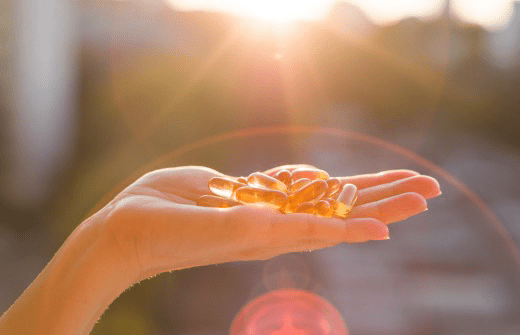Sports performance is not just a matter of training and discipline – high-quality nutrition and thoughtful supplementation also play a crucial role. Whether you're engaging in recreational or competitive sports, the right combination of supplements can help support performance, speed up recovery, and prevent the body from becoming overloaded.
What will you learn in this article?
- How to balance adaptation to stress, inflammation, and oxidative stress in sports
- Signs you're overloading your body through exercise
- When and how to start supplementing?
- How specific vitamins and minerals help the body cope with physical stress
- What to supplement and when?
- Other recovery strategies
- Key takeaways from this article
How to balance adaptation, inflammation, and oxidative stress in sports
Exercise offers numerous benefits for our health. It stimulates the release of “feel-good” neurotransmitters – endorphins, serotonin, and dopamine – reduces mental stress, supports metabolic health, and builds muscle mass, which is associated with longevity. Strength training also contributes to increasing bone strength, which is key for preventing osteoporosis.
However, physical activity also places a certain amount of stress on the body, depending on the type and intensity of exercise – it causes mechanical strain on muscles, increases oxygen demand, raises oxidative stress, and triggers a short-term inflammatory response.
This response is a natural part of the body's recovery process to some extent. Free radicals produced during exercise can damage cells, but they also initiate adaptation mechanisms. To support muscle tissue recovery, protect cells from damage, maintain immune function, and sustain long-term performance, it's important to keep a balance between oxidative and antioxidant mechanisms. Both excessive free radicals (oxidants) and excessive antioxidant supplementation can disrupt this balance and interfere with cellular signaling and adaptive processes.
However, intense and prolonged training without adequate recovery can result in generally higher levels of inflammatory mediators, increasing the risk of injury and chronic inflammation. If the post-exercise inflammatory response is too strong or occurs too frequently (e.g., due to overtraining), it can become harmful to the body.
Excessive and chronically unresolved inflammation after exercise can lead to long-term issues – injuries, fatigue, slowed recovery, and weakened immunity. Diet alone often can’t meet these increased demands – especially if you train regularly or intensely. In this context, targeted supplementation plays a very important role by helping the body cope with the load more efficiently.

Signs you're overloading your body through exercise
During exercise, a complex cascade of inflammatory events is triggered. These depend on the type, intensity, duration, and form of activity, as well as the individual's age, health status, and ability to adapt to stress – which may manifest as:
Muscle soreness
-
May appear 12–48 hours after intense activity.
-
Typically occurs after high-intensity movements (e.g., downhill running or strength training).
-
Intense workouts can cause microtears in the muscles and trigger an inflammatory response.
-
Is post-exercise muscle soreness normal? Yes and no – it depends on how long it lasts and how intense it is.
Elevated inflammatory markers
-
The body activates the immune system to initiate tissue repair. This results in increased levels of acute-phase reactants – CRP (C-reactive protein), IL-6 (interleukin-6), and TNF-α (tumor necrosis factor-alpha).
Fatigue and slow recovery
-
Inflammatory processes can temporarily disrupt energy metabolism and cause fatigue.
Mildly elevated body temperature
-
Due to cytokine release and activation of immune cells, body temperature may rise slightly.
Increased oxidative stress
-
There is increased production of free radicals.
-
The body’s antioxidant systems are temporarily burdened by physical activity.
Increased intestinal permeability (Leaky Gut)
-
Compromised gut barrier integrity can be triggered or worsened by intense physical activity, especially during endurance and high-intensity exercise (e.g., marathons, HIIT, strength training without recovery).

When and how to start supplementing?
In the long term, it makes sense to take supplements on a daily basis and to choose regular use even on non-training days for a longer-lasting effect.
However, on days with higher physical activity, it is good to focus specifically on providing greater support to the body through a more comprehensive morning preparation. The time immediately after exercise is also important, as this is when the body needs the most nutrients to repair tissue, replenish glycogen stores, and reduce excessive inflammatory responses.
Supplementation during sports and to support regeneration must be adjusted individually, taking into account physical constitution, weight, the body's ability to adapt to physical stress, and the type of activity performed—endurance or strength training. Paradoxically, people who only exercise occasionally may need higher doses of antioxidants than active athletes, for whom short-term inflammation may be necessary for further training adaptation.
How Specific Vitamins and Minerals Help the Body Cope with Physical Stress
Supplementation for sports performance and recovery support should be individualized, taking into account physical constitution, body weight, the body's adaptability to physical stress, and the type of activity — endurance or strength-based. People who exercise only occasionally may paradoxically need higher doses of antioxidants than regular athletes, for whom short-term inflammation is often necessary for further training adaptation.
Magnesium, Zinc (Chelate) + Vitamin B6
-
Helps prevent muscle cramps and supports post-exercise recovery
-
Recommended use: 2–6 capsules of magnesium daily in two doses, at any time of day — ideally after exercise and in the evening. Recreational athletes will need lower doses than active athletes.
Multivitamin Daily F20 Complex
-
Contains a wide spectrum of nutrients (e.g. selenium, B vitamins, K2 MK-7, D, E, iodine, zinc) that support energy production, tissue repair, and immunity
-
Recommended use: 2 powder capsules + 1 liquid capsule with food.
Omega-3 Fatty Acids
-
Reduce inflammation and support recovery after physical exertion
-
We recommend choosing omega-3 from krill in phospholipid form, which integrates easily into cell membranes and effectively lowers inflammation while enhancing regeneration
-
Help maintain gut barrier integrity and reduce the production of pro-inflammatory mediators
-
Recommended use: Ideally, 2–4 capsules of Krill Oil immediately after exercise — depending on individual needs and measured omega-3 index values. Omega-3s in phospholipid form act as “first aid” for recovery support.
Vitamin D3
-
Supports immune health.
-
Studies suggest that vitamin D supplementation may have a positive effect on muscle function and enhance recovery after exercise, especially in individuals with deficiency.
-
We recommend maintaining optimal blood levels of vitamin D between 100–150 nmol/L. If your vitamin D levels are low, it’s advisable to supplement more than 1000 IU per day.
-
Suggested use: an individually adjusted amount based on blood test results, taken with a meal containing fat.
-
We always recommend supplementing with vitamin K2.
Vitamin K2
-
Vitamin K2 may support long-term bone and vascular health — both key areas for recovery and injury prevention in athletes.
-
Suggested use: 1 capsule of Vitamin K2 (120 μg) per day – ideally taken with a meal containing fat.
ProLife
-
The complex of astaxanthin and vitamin E (as tocopherols and tocotrienols) helps reduce oxidative stress and inflammation after physical effort.
-
Suggested use: 1–2 capsules per day as needed. In extreme cases, you can take up to 6 capsules in one dose (e.g., after a marathon).
-
We recommend timing supplementation in the morning to avoid interfering with the body's post-exercise adaptation.
Zinc (Chelated)
-
During periods of increased physical load and training cycles, it may be helpful to add an extra dose of zinc on top of what’s already included in the Daily F20 Complex multivitamin.
-
Suggested use: Standard dose is 1 capsule per day (15 mg zinc). Short-term higher doses of 30–45 mg can be used depending on physical load and immune system support needs.
Organic Acerola
-
Natural source of vitamin C to support immunity and collagen production.
-
Thanks to being a natural source synergistically combined with other micronutrients (provitamin A, some B vitamins, potassium, magnesium, calcium, phosphorus, sodium, zinc, and iron), it does not disrupt redox balance or post-exercise recovery.
-
Suggested use: 1–3 capsules daily as needed. In extreme situations, up to 6 capsules may be used.
-
We recommend opening the capsules and dissolving in water to enjoy as a pleasant-tasting drink.
Iron
-
During intense training, the demand for red blood cell production and oxygen transport increases — as does the need for iron.
-
Deficiency can lead to reduced performance, fatigue, shortness of breath, and slower recovery.
-
For endurance athletes at a professional level, we recommend supplementing iron based on full blood test results, ideally under the guidance of a specialist.
-
Suggested use: individual dosage, ideally in the morning.
L-glutamine and L-glycine
-
These are amino acids that support gut lining health and regeneration — especially L-glutamine.
-
L-glycine is essential for muscle recovery, making it a crucial supplement especially for athletes.
What and when to supplement?
Additional Recovery Strategies
To enhance recovery — not only after exercise — we recommend including foods in your diet that are rich in:
-
easily digestible proteins, which the body can quickly use for muscle repair and regeneration (eggs, chicken/turkey, lean wild fish).
-
Omega-3 fatty acids (fatty wild-caught fish such as salmon, sardines, mackerel, and some nuts and seeds — walnuts, chia seeds, hemp seeds, flaxseeds).
-
Antioxidants (wild berries and dark leafy greens — the darker and more intense the color, the higher the likely antioxidant content).
! Avoid alcohol and processed foods, which can worsen inflammation and slow recovery.!
Give your body:
-
Plenty of sleep
-
A diet rich in antioxidants and omega-3 fatty acids
-
Properly chosen supplementation
-
Relaxation – sauna, massages, breathing techniques, light movement, and stretching on rest days
Key takeaways
-
Inflammation after exercise is natural, but it should be properly balanced.
-
Oxidative stress and inflammation arise as part of the adaptive response to physical exertion — the body can handle them if it has enough nutrients and time for recovery.
-
Targeted supplementation can significantly help manage the inflammatory response, accelerate recovery, and improve resilience.
-
For recovery support, we recommend: magnesium, zinc (chelated), Daily F20 multivitamin, vitamin D3+K2, omega-3 fatty acids from krill, and antioxidants like astaxanthin, vitamin E, and vitamin C.
-
And don’t forget the importance of quality sleep and nutrition!
Sources:
https://pmc.ncbi.nlm.nih.gov/articles/PMC6962351/



















